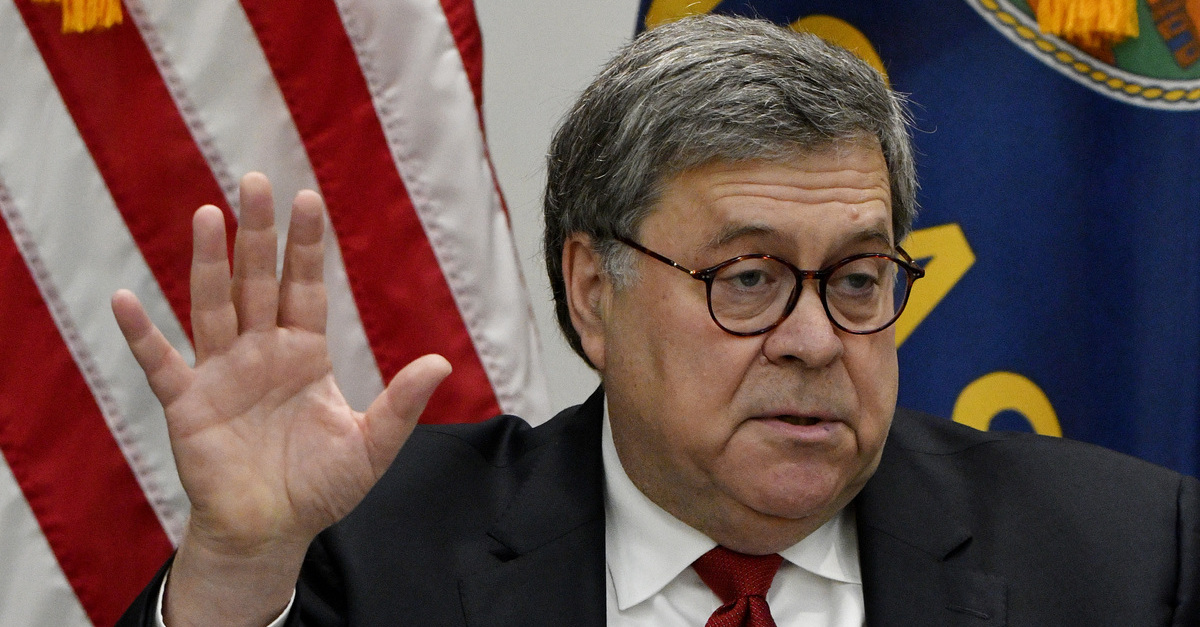
Attorney General Bill Barr is believed by many to owe his current position to a long and unsolicited memo sent to the U.S. Department of Justice (DOJ) criticizing the work of then-special counsel Robert Mueller. Now, a newly released email shows that DOJ personnel communicated with Fox News Channel to promote the Barr memo’s findings in late 2018.
Widely criticized as various versions of “bizarre,” the 20-page Barr memo was dated June 8, 2018 and sent to then-deputy attorney general Rod Rosenstein. The memo’s existence became public knowledge less than two weeks after Barr was formally nominated to replace then-outgoing attorney general Jeff Sessions.
President Donald Trump announced his intent to nominate Barr six months after the memo, on December 7, 2018. Trump made his formal nomination of Barr on January 3, 2019. The senate confirmed Barr on February 14, 2019.
The memo broadly questions the scope of Mueller’s dual-pronged inquiry into obstruction of justice and Russian-sourced electoral interference and argues that Mueller had no business questioning President Donald Trump about alleged obstruction of justice due to the firing of former FBI director James Comey.
The Barr memo was reported by the Wall Street Journal on the night of December 19, 2018. Almost instantaneously, Fox News received talking points via a two-page email which highlighted the memo’s assessments. The points came from DOJ’s Office of Public Affairs Director Kerri Kupec.
Obtained via the Freedom of Information Act (FOIA) by journalist and FOIA maven Jason Leopold, the newly-released email dated December 19, 2018 and bearing a time stamp of 9:06 p.m. is addressed to Fox News @ Night host Shannon Bream. All of the boldface type that appears in the following quoted lines appears as boldface type in the original Kupec-Bream document.
The document begins with a “Background” section that leans heavily into criticism of the Mueller investigation while insisting that “Barr’s memo was unsolicited.” The second section is fashioned as a “Memo.” An “Other Points” section assures the reader that Barr did not act unethically by sending the memo and that any decisions Barr makes “about specific matters” would also be considered ethical.
“Barr’s memo was written during a time when there was widespread, public speculation that Special Counsel Mueller would seek to compel President Trump to submit to an interview so that Mueller could evaluate his state of mind when he fired James Comey,” the first section notes. “The supposed legal theory was that Trump may have obstructed justice if he exercised his constitutional prerogative to fire Comey for ‘corrupt’ reasons. Barr was understandably concerned about how this theory would affect the functions of the Department of Justice.”
“Barr’s memo is akin to a law review article,” the second section begins, “It meticulously dissects and analyzes a specific subsection of one federal obstruction statute, explaining why it does not support what Barr speculated to be an obstruction theory of Mueller’s and explains why such a theory, if pursued, would damage the Department.”
From the Kupec-Bream email, at length:
Barr distinguished two categories of presidential conduct that might be termed “obstruction of justice”:1. The act of sabotaging a proceeding’s truth-finding function–for example when a person destroys or alters evidence. These actions are inherently subversive and wrong and are therefore committed with a culpable state of mind. Barr observed that a President may fairly be accused of this kind of obstruction as Nixon and Clinton were, and that investigating this form of wrongdoing does not invade the President’s discretion to perform his constitutional duties.2. Undertaking a facially lawful action — such as making a personnel decision — in a manner that is thought to have been “corrupt” as a matter of federal statutory criminal law. These are actions that are permissible on their face but would theoretically constitute obstruction because, for example, they were performed with a subjectively bad state of mind or improper motive.
“Were the Department to adopt the second category as obstruction, Barr argued, it would have disastrous implications for the Presidency, the Department of Justice, and the Executive Branch as a whole,” the talking points email continues.
Barr argued that the implications of this theory of obstruction are dire for the Department of Justice. Everyday decisions to conclude or constrain an investigation by DOJ lawyers would be open to inquiry as potential criminal obstruction. Failure to open such inquiries may itself be regarded as corrupt. The result would be the further “criminalization” of standard political disputes between the political parties and branches of government.
Law&Crime reached out to DOJ for comment on this article but no response was forthcoming at the time of publication.
UPDATE:
A FOX News spokesperson pointed to the following DOJ tweet which indicated that the DOJ shared similar information with additional outlets:
Read the full email below:
Kupec-Bream Talking Points … by Law&Crime on Scribd
[image via Ed Zurga/Getty Images]